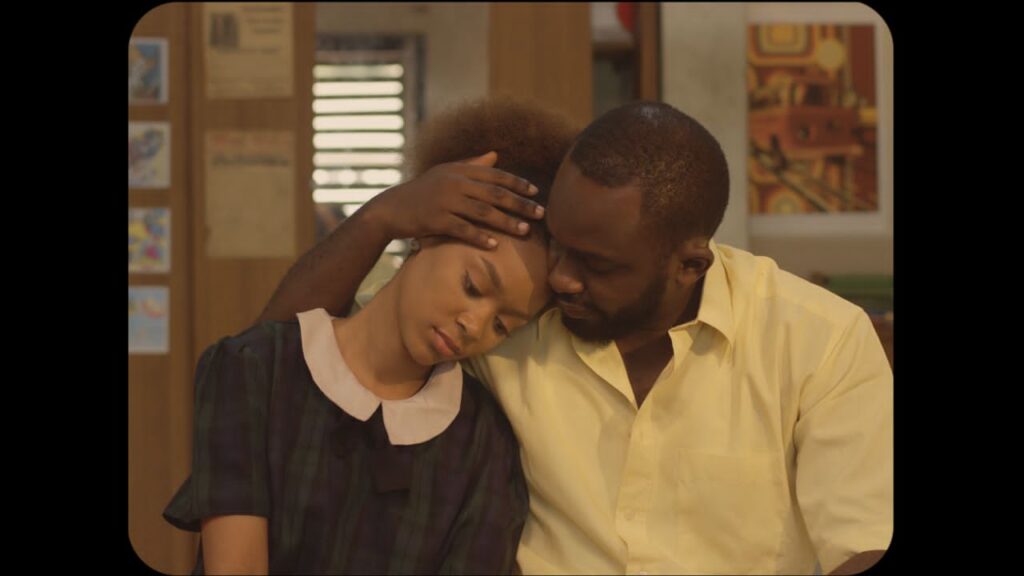Crushed Roses (2022): The Highs and Lows of Young Love.
While watching Crushed Roses, I was reminded of Goodbye First Love (2011), the third feature film from French director, Mia Hansen-Love, about the highs and lows of young love. In his review of the film, the late great Roger Ebert writes: “We think of first love as sweet and valuable, a blessed if hazardous condition. This film, deeper than it seems, dares to suggest that beyond a certain point, it can represent a tragedy.” Young love is also at the centre of Taiwo Egunjobi’ s latest film, in all the ways we’ve come to expect: euphoric, confusing, unrequited. It is present in all its innocence and hopefulness, like a gazelle, full of energy, frolicking in the fields, unaware of the poachers hidden in the trees, ready to end its life. The title of the film underscores this point— crushed roses are dead roses, fit only for potpourri, mulch, or most likely the garbage can. From the first shot, first line, first note of the musical score heard, it is clear that this entire situation is a tragedy waiting to unfold. Zainab (Tolulope Osalie) is a student at the University of Ibadan where she meets Wale Badmus (Temilolu Fosudo), a young man she describes as “ineffably perfect” and a “sketch dropped from the divine.” The nature of their relationship is soon revealed. They are best friends. Zainab calls them a perfect union. “My thoughts were his,” she says, or like the kids today would put it, the pair seem to “share a brain cell.” But Zainab wants a lot more than friendship, she wants forever, as revealed by the lines, “He spins my heart into tight knots…God’s perfect creation.” Turns out God’s perfect creation is also a wanted man. Wanted by whom, you ask? About half the female population on campus, it appears. Zainab meets up with Boma, a fellow poet, but she is so bored listening to him talk about poetry in general and Emily Dickinson in particular, that she goes back to Wale and laments. Boma seems like a perfectly reasonable guy, but Zainab has eyes for only one person. The heart wants what the heart wants and whatnot. Crushed Roses feels in many ways like a silent film, transcendental in the way it juxtaposes the elements in every frame and in the way it is put together scene by scene. If given the stills after being told the premise (or maybe even not) one can feel out the story from each of the shots. Egunjobi’s composition, reminiscent of none other than the films of Yasujiro Ozu, tells the story in broad strokes, placing frame after frame of moving pictures that are arresting, austere and alive. A personal favorite is one wide shot where Zainab is writing a poem for Wale to give to one of his many lovers. She is standing with her back to a car, busy scrawling romantic lines in her notepad. Wale is positioned on the car, gazing into the distance, either bored or deep in thought. The point is he is not there. Present in flesh alone. Zainab steals a look at him but his attention doesn’t shift. The irony of the whole situation is immense and yet the film devotes only a couple seconds to expressing it, choosing to let instances like these build up in the audience’s minds rather than beat them over the head with it. It might also be possible to simply listen to Crushed Roses and still understand everything going on, and still get a sense of the characters, their desires, and the general tone of the film. Adapted by Isaac Ayodeji from a novelette by Ibiere Addey, the narration, poetic though it may be, never veers into esoteric territory, or turn off people not fond or familiar with the genre. The dialogue is free of gratuitous melodrama, and instead uses subtext and good characterization to move the narrative forward. Crushed Roses is the kind of film that demands one’s full attention, and subsequently rewards it. All the elements are so understated that you might find yourself almost leaning into the screen to pick up on every gesture and sound. This isn’t switch-off-your-brain cinema. Not by a long shot. Love is the kind of emotion that demands all the maximalism that cinema has at its disposal. All the sounds and lights and dizzying camera movements and melodramatic performances that the filmmakers can afford. Think the works of Baz Luhrmann or Brian De Palma. However, Egunjobi and his cast and crew choose to go the way of minimalism and it works. Which isn’t to say the film doesn’t apply formalist techniques when it can. In one scene, where Zainab is performing a poem, the change in lighting drives home the devastation and regret of one character in a quiet yet deliberate manner. When you are young and in love, the highs feel like butterflies in your stomach, surfing through the clouds, and soaring over the rainbow. The lows are equally as impactful. Music becomes unnerving, poetry tastes like bile, and even if all the bulbs around are shining bright, it feels like someone just turned the lights off on your world. Like Zainab says around the 12-minute mark: “How do you escape a chokehold, a stampede on both sides? Is freedom an illusion?” In Goodbye First Love (2011), the main character is also a young lady. Her boyfriend breaks her heart in the most brutal way possible and returns years later, without much consequence to his actions. Ebert found this aggravating and wished the movie would hold the young man, whom he describes as “an egotistical pig who thinks the world revolves around him,” accountable. Crushed Roses delivers on this front. Zainab rejects Wale’s eventual advances, choosing to leave that whole chapter in the past. At the end, he is left licking his wounds and she is heartbroken at the idea of what could have been. The on-screen chemistry between Osalie and Fosudo makes this all the more believable


